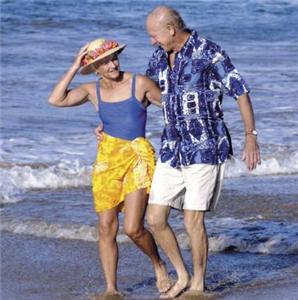
In case you were wondering about whether or not to take that walk outside today, a new study has shown that vitamin D is linked to lower death rates among the elderly. The University of Colorado Denver, and Massachusetts General Hospital (MGH) recently published findings that patients over 65 with low levels of vitamin D are three times more likely to die of heart disease than their peers with adequate amounts. The same group was two and half times more likely to die no matter the cause. Holy crap! This research makes it sound like not taking vitamin D supplements is a guaranteed death sentence.
The study was quite appropriately published in the Journal of the American Geriatric Society, but it could have wider implications outside of geriatrics. Vitamin D’s ability to prevent heart disease and stroke could be useful for those in middle age or younger. UC Denver and MGH also completed an earlier study (in the Archives of Internal Medicine) that demonstrate how vitamin D could boost the immune system against colds and flu. The National Institute for Health is currently ramping up VITAL, a five year study to determine the effects of long term use of supplements of vitamin D and fish oil. VITAL is going to be huge.
Not that this trial was particularly small. UC Denver and MGH studied the data from the Third National Health and Nutrition Examination Survey conducted by the National Center for Health Statistics and the Center for Disease Control. In that survey, 3,400 volunteers over 65 years of age were selected to represent a cross section of America’s 24 million older adults. They were followed, on average, for more than seven years.
While the study highlights the connection between vitamin D and mortality, this doesn’t mean there’s necessarily a causal relation. As stated in the MGH press release, it is likely that one third of all older adults in the US have low levels of vitamin D, probably due to limited outdoor sun exposure. How do you get sun exposure? By being active. So connections between vitamin D and mortality may simply be demonstrating that active old people live longer. Or it could be that vitamin D supplements are the fountain of youth. We don’t know, and very wisely the authors of the study are calling for larger randomized trials.
Which is probably where VITAL is going to fit in. We have plenty of inconclusive proof that vitamin D (and fish oil) are linked to longer, healthier living. Inconclusive only because causal relationships can’t be determined in many of the studies. What we need now is a greater understanding of whether vitamin D and fish oil supplements can really help us, or if the behavior that naturally raises levels of these substances is the real cure-all. VITAL will help with that understanding, but in the following five years you and I can run our own experiment. Let’s enjoy more outdoor activities, eat a diet with more lean proteins from small fish and see where that gets us. Maybe we’ll create new Blue Zones.



